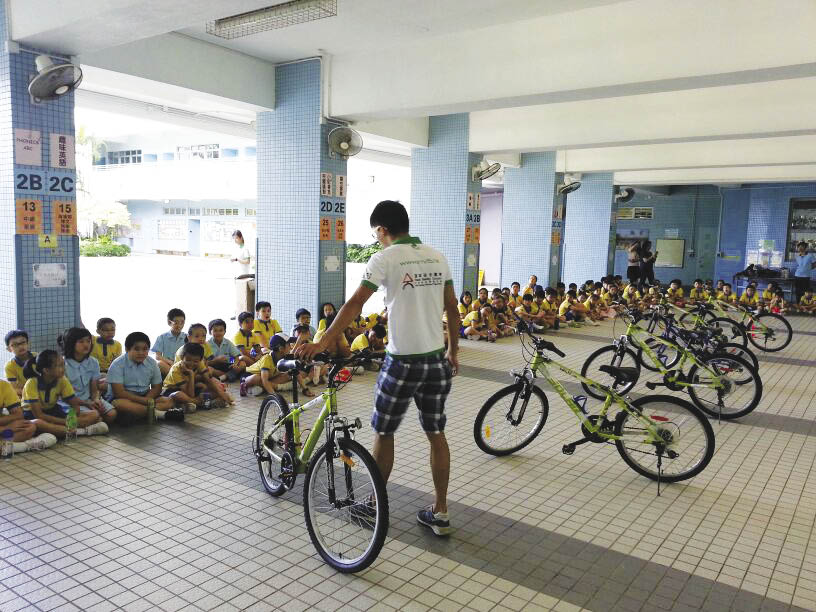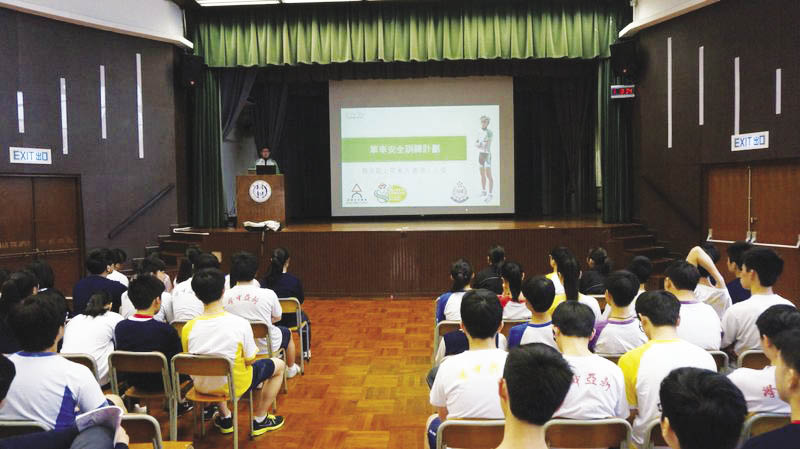|
| Desktop version | 繁體版 | 简体版 |
| About Road Safety Council | Publicity | Education | |
| Legislation and Enforcement | Road Safety Funding | Non-Government Organisations | |
| The Way Forward | Annex | Acknowledgement |
EducationSafety Through EducationThe Council has an increasingly important role to educate the public about road safety. It performs this duty by identifying focal points, initiating curriculum-based programmes and course tools as well as co-ordinating the work of other groups interested in, or responsible for, road safety. This multi-agency approach is particularly effective in wide-ranging community education initiatives across all age groups. The concerted efforts of District Councils, schools, community centres and non-governmental organisations produce a variety of road safety education. Lectures and seminars are given by the Police to various groups and organisations at venues including the Road Safety Bus, Road Safety Towns, schools, centres for the elderly and other community venues. The messages delivered are tailored to specific groups and audiences. For example, road safety educational programmes designed for new immigrants to Hong Kong help these newcomers better understand local regulations and requirements. In addition, Road Safety Bulletins prepared by the Transport Department are also regularly distributed to stakeholders to enhance understanding of traffic regulations and of the importance of obeying traffic rules; to disseminate road safety messages; and to enhance the road safety awareness of all road users.
Youth EducationThe Road Safety Towns are owned and managed by the Leisure and Cultural Services Department while lectures on road safety are delivered by Police Road Safety Teams. The towns transform road safety education into a fun experience for children and other young people, in a pleasant and comfortable environment. The towns attracted more than 45,000 visitors of all ages in 2013. They are popular destinations for kindergartens and primary schools, as well as clubs, social service groups and elderly service organisations. Open days with interactive games and performances are regularly held to promote road safety themes. Hong Kong’s four Road Safety Towns are:
For many years, the Road Safety Bus has delivered road safety messages to students at schools, residents at housing estates and children at youth centres. The Road Safety Bus had more than 27,000 visitors in 2013, underscoring the valuable role it plays in road safety education. The current Road Safety Bus has served the public for over 10 years and is projected to be replaced in 2017. In addition to raising road safety awareness and developing good practice, we continue to reach out to young people through interactive educational activities.
School EducationA holistic school curriculum comprising knowledge, skills and attitude is provided for students in accordance with their developmental needs. One of the learning objectives of pre-school education is for children to know how to protect themselves from early childhood by nurturing basic safety habits and awareness. Elements of road safety education, such as understanding safety regulations, cycling safety, proper use of public transport and common causes of traffic accidents, are also covered in Key Learning Areas and subjects in primary and secondary education. These include General Studies at the primary level and the Personal, Social and Humanities Education and Physical Education at the secondary level. Students develop consistently appropriate attitudes towards road use and have their safety awareness heightened during learning in a variety of topics. When promoting road safety education, schools may utilise learning and teaching materials, including educational television programmes, lesson plan exemplars and web-based resources provided by the Council. In addition, corresponding life-wide learning activities such as the Hong Kong Road Safety Patrol and Safe Cycling Training Programme are organised to provide an authentic learning experience for students to develop a broader sense of road safety and strengthen their awareness and habits. Positive values that the school curriculum stresses – such as responsibility, respect and care for others, and civic awareness – are indispensable personal qualities for students to be responsible road users.
Cyclist EducationWe attach great importance to cycling safety. In recent years, the Council, the Police and Transport Department have been promoting cycling safety through a variety of publicity and educational activities. In view of the increasing popularity of cycling in Hong Kong, we are boosting our efforts in this area. Major recent undertakings have included:
Driver EducationTo enhance safe driving and health awareness of commercial vehicle drivers, the Transport Department has conducted the ‘Safe Driving and Health Campaign’ annually. A wide range of services and activities were provided under the campaign in 2013. These include the dissemination of safe driving and health messages through radio stations and other publicity channels, as well as the provision of free health checks to commercial vehicle drivers in cooperation with non-profit making medical organisations. The ‘Driver Improvement Scheme’, introduced by Transport Department in 2002, continues to provide courses for drivers wishing to improve their driving behaviour, for drivers who have accumulated 10 or more driving-offence points (DOPs) for offences committed during a two-year period, and for those otherwise ordered to attend by a court due to conviction of a serious traffic offence. Once all sessions and assignments are successfully completed, drivers receive a certificate and, when relevant, have their DOP total reduced by three. Since the implementation of the Driving Improvement Scheme in September 2002 and up to December 2013, nearly 98,900 drivers have attended the course. Encouragingly, about 80% of the participants did not incur any new DOPs within six months of completing the driving improvement course.
Pedestrian SafetyIn Hong Kong, elderly pedestrians remain vulnerable to road accidents. The Council continues to focus many of its seminars, campaigns, bus parades, road safety messages and publicity and educational programmes on this demographic group, emphasising proper road use and crossing technique. In particular, we continue to broadcast the television API reminding the elderly to ‘Love Yourself, Love Your Family, Be a Smart Pedestrian’. The Council also worked closely with District Councils to conduct education in areas with relatively more traffic accidents involving elderly pedestrians to remind the elderly to use proper road crossing facilities. A road safety competition programme and a radio drama broadcast on RTHK Radio 5 successfully attracted great attention from the elderly in 2013. The Council will continue to make use of the RTHK Radio 5 programme to promulgate safety messages to the elderly in 2014. A Road Safety Bulletin ‘Smart Driving with Care and Courtesy’ has been produced to disseminate safety messages to motorists to drive with courtesy and be considerate to pedestrians walking on roads and using pedestrian crossing facilities. For further information, please visit:
|
|||||||||||||||
| Previous Publicity | Next Road Safety Measures | ||||||||||||||
| Chairman's Foreword | |||||||||||||||
| About Road Safety Council | |||||||||||||||
| Publicity | |||||||||||||||
| Education | |||||||||||||||
| Road Safety Measures | |||||||||||||||
| Legislation and Enforcement | |||||||||||||||
| Road Safety Funding | |||||||||||||||
| Non-Government Organisations | |||||||||||||||
| Traffic Accidents Statistics | |||||||||||||||
| The Way Forward | |||||||||||||||
| Annex | |||||||||||||||
| Acknowledgement | |||||||||||||||



